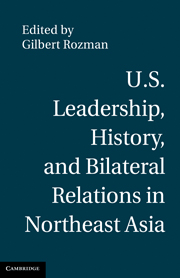Book contents
- Frontmatter
- Contents
- List of Contributors
- Acknowledgments
- U.S. Leadership, History, and Bilateral Relations in Northeast Asia
- Introduction
- PART I HISTORICAL MEMORIES AND BILATERAL TIES WITH ALLIES
- PART II HISTORICAL MEMORIES, JAPANESE–SOUTH KOREAN RELATIONS, AND U.S. VALUES
- 4 Japan–South Korea Relations and the Role of the United States on History
- 5 Getting Away or Getting In?
- 6 U.S. Strategic Thinking on the Japanese–South Korean Historical Dispute
- PART III HISTORICAL MEMORIES, SINO–SOUTH KOREAN RELATIONS, AND U.S. VALUES
- Index
6 - U.S. Strategic Thinking on the Japanese–South Korean Historical Dispute
from PART II - HISTORICAL MEMORIES, JAPANESE–SOUTH KOREAN RELATIONS, AND U.S. VALUES
Published online by Cambridge University Press: 01 March 2011
- Frontmatter
- Contents
- List of Contributors
- Acknowledgments
- U.S. Leadership, History, and Bilateral Relations in Northeast Asia
- Introduction
- PART I HISTORICAL MEMORIES AND BILATERAL TIES WITH ALLIES
- PART II HISTORICAL MEMORIES, JAPANESE–SOUTH KOREAN RELATIONS, AND U.S. VALUES
- 4 Japan–South Korea Relations and the Role of the United States on History
- 5 Getting Away or Getting In?
- 6 U.S. Strategic Thinking on the Japanese–South Korean Historical Dispute
- PART III HISTORICAL MEMORIES, SINO–SOUTH KOREAN RELATIONS, AND U.S. VALUES
- Index
Summary
In 2005, Japanese–South Korean relations deteriorated in the face of differences over historical memories and a related territorial dispute. Similar downturns had occurred periodically over a quarter-century, and few expected these differences to be overcome or to lose their explosive potential. In 2009, new leadership in each country pledged to build a future-oriented relationship, avoiding any impasse over historical memories. With the DPJ, led by Hatoyama Yukio, replacing the revisionist-driven LDP, and Lee Myung-bak at the head of South Korean conservatives determined not to repeat Roh Moo-hyun's outbursts, hopes had again risen for full normalization of relations between two U.S. allies whose shared threat perceptions should draw them closer and facilitate triangular cooperation. While the new situation could reinforce U.S. optimism that history is fading as a problem and the best response is to maintain an attitude of non-involvement, another option is to seize the opportunity to play an active role by addressing history in a manner that could diminish its future impact. Reviewing past U.S. responses and new circumstances, this chapter scrutinizes developments in 2006 through 2009 to assess prospects for a breakthrough.
The United States has avoided involvement in the history issue that divides its two allies in Northeast Asia. Although Americans mostly sympathize with South Korea's position, sharing condemnation of Japan's militarism in the years leading to its defeat in August 1945, they attach low priority to addressing the issue.
- Type
- Chapter
- Information
- Publisher: Cambridge University PressPrint publication year: 2010



